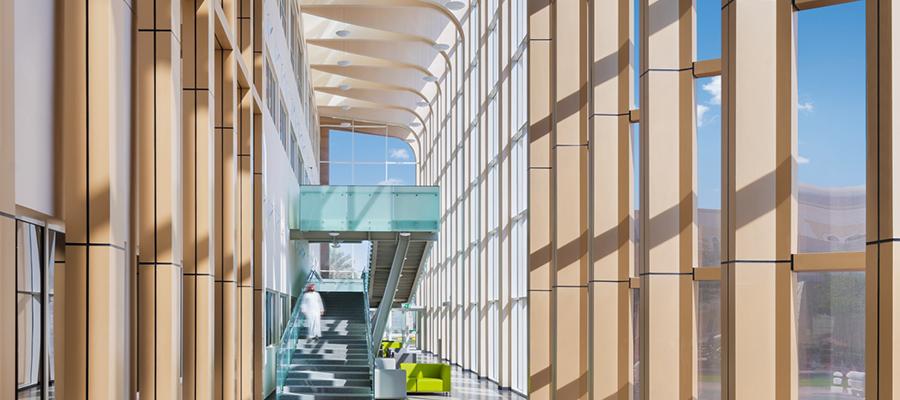- About
- Admissions
- Study at AUS
- Prospective Students
- Bachelor's Degrees
- Master's Degrees
- Doctoral Degrees
- Admission Publications
- International Students
- Contact Admissions
- Grants and Scholarships
- Sponsorship Liaison Services
- Testing Center
- New Undergraduate Student Guide
- Undergraduate Orientation
- New Graduate Student Guide
- Graduate Orientation
- File Completion
- Payment Guide
- Students with Disabilities
- Executive and Continuing Education
- Academics
- Life at AUS
- Research
- Publications
- Contact Us
- Apply Now
- .

CEN student team wins Best Paper award at IEEE conference
A team from American University of Sharjah (AUS) that developed an innovative solution to a pervasive problem afflicting the global medical industry has been awarded Best Paper at the IEEE 2020 International Conference on Internet of Things and Intelligence System (IoTaIS 2020) held recently in Indonesia.
The paper presents the outcomes of the team’s senior design project in the Bachelor of Science in Computer Engineering program. Computer engineering majors Omar El Boutari, Tasneem Batool and Mostafa Abuelnoor, mentored by Dr. Fadi Aloul, Professor and Head of the Department of Computer Science and Engineering, and Dr. Assim Sagahyroon, Professor of Engineering and Associate Dean of the AUS College of Engineering, collaborated to address the issue of medical no-shows—appointments that a patient misses without prior cancellation.
“Our objective was to put together an upgradeable prototype of a system which mitigates an issue that plagues a certain regional—or even global—industry,” explained El Boutari, speaking on behalf of the team.
After due research, the team decided to focus on medical no-shows, a global problem that negatively impacts economies of nations around the world. Hospitals and outpatient clinics incur high costs for equipment rentals and suffer opportunity costs for in-house medical practitioners and specialists when patients fail to show for appointments. According to a 2019 Forbes report, an estimated $150 billion is lost annually due to no-shows in the USA alone. Hospitals are actively trying to implement methods designed to reduce the idle time caused by patient no-shows by using overbooking and reminder systems. However, these two methods can be very costly. Overbooking, for instance, can lead to patient dissatisfaction, and constant personalized reminders, such as phone calls to every patient, can be annoying to patients and costly in terms of staffing.
To tackle this problem, the team focused on developing a machine learning model that uses existing patient datasets to discover patterns and relationships between multiple patient variables and patients’ tendency to miss appointments. The team developed the Appointment Scheduling and Intuitive Management (ASIM) system, which allows medical administrators to predict the likelihood of a patient to miss an appointment and to take steps to address the issue. It also provides patients with easy ways to electronically register profiles and schedule appointments with their desired medical practitioners via a mobile app running on both Android and iOS. Real patient datasets containing anonymous patient details—such as age, gender and condition—and the patients’ habit of attending or missing an appointment were used in developing ASIM.
"With this system, our team hopes to ultimately create a positive impact on the experiences of both patients and clinic staff, which suffer from adverse consequences of medical no-shows. More so, we look forward to a future which is even more enriched by data science and computer science advancements, a future in which increasing numbers of research papers and projects are completed to further mitigate this phenomenon by utilizing the latest technologies and techniques," said El Boutari.
Elaborating on the project, Dr. Aloul explained:
“The system proposed allows for a reduction of financial losses globally due to no-shows. By deploying the ASIM system and further improving its design, clinics can now reliably predict a no-show and, in turn, overbook or remind the patient in question to minimize opportunity cost. The proposed system may also be extended to other businesses that have a high chance of customer congestion, cancellation possibility, and inherent financial losses per booking missed, such as hotels and restaurants.
“The students worked very hard to bring this project to fruition. At the Department of Computer Science and Engineering, we encourage all our students to utilize the latest concepts in technology to conceive out-of-the-box, innovative solutions to the many challenges facing societies today,” he added.
Commenting on the international success garnered by the project, Dr. Sagahyroon, said:
“We are very pleased to have had this paper recognized at an important forum such as the IoTaIS 2020. This latest award is validation, once again, for why AUS students are considered among the best in the region.”
For more information about the AUS Department of Computer Science and Engineering, please visit: www.aus.edu/cen/department-of-computer-science-and-engineering.

